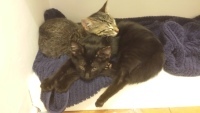Rachel Manija Brown's Blog, page 147
August 3, 2017
Brave Girl Eating: A Family's Struggle With Anorexia, by Harriet Brown
A memoir by the mother of a teenage girl with anorexia, written with her daughter's consent. (Her daughter is given the pseudonym "Kitty.")
There are a number of memoirs by people with anorexia (by far the best-written is Wasted by Marya Hornbacher, which is worth reading for the prose quality alone), but fewer by their loved ones. But a child with an eating disorder affects and is affected by the whole family.
This book attracted some really angry negative reviews, many of which took very vehement exception to Brown's refusal to take the blame for her daughter's illness, and for her saying that her family became temporarily dysfunctional due to the stress of it, but was doing basically okay before and after. I have no idea whether that's true or not, since all I can go by is the book itself. But I was struck by how pissed off a subsection of readers were at a mother saying, "This wasn't my fault" and "I think my family has good relationships," and how sure they were that this couldn't possibly be the case--that if a child has a mental illness, the mother and her family must be to blame.
Brown thinks the culprit is a combination of genetic predisposition and social pressure. She leans more heavily on the former as a factor in anorexia in general than I personally would, and if her account is correct, it does sound like that played more of a part in her daughter's case than it usually does. From her perspective, anorexia descended on her daughter like the demon in The Exorcist; while Brown herself had some mild issues with eating and weight that could have also affected her daughter, they're the sort of issues that probably 90% of white American moms have, and 90% of all daughters aren't anorexic. She might be in total denial about terrible problems within the family... but she might not be. Being a "good enough" family isn't a magic shield against mental illness.
As a memoir, it's gripping and well-written, and makes a convincing case for the family-based (Maudsley) approach to treating anorexia. (That approach also has very convincing evidence behind it.) But it's the response to it that fascinates me. Like I said, maybe the reviewers are right that she's lying or in denial. Brown does sound a little defensive. But who wouldn't sound defensive if she's constantly getting blamed for the illness that nearly killed her daughter? Could any mother have told her story without being blamed?
Americans are very apt to blame the victim. In every respect. And that goes one million if they're female. Were you raped? It's your fault for going on a date/wearing that dress/trusting your uncle/not buying a state of the art home security system. Do you have anorexia? You're vain/weak-willed/selfish/not really sick. Does your child have anorexia? You're a bad mother.
Brown's unknowable truthfulness or accuracy aside, there is nothing more infuriating to a big section of America than a woman who says, "It wasn't my fault."
Brave Girl Eating: A Family's Struggle with Anorexia[image error]
 comments
comments
There are a number of memoirs by people with anorexia (by far the best-written is Wasted by Marya Hornbacher, which is worth reading for the prose quality alone), but fewer by their loved ones. But a child with an eating disorder affects and is affected by the whole family.
This book attracted some really angry negative reviews, many of which took very vehement exception to Brown's refusal to take the blame for her daughter's illness, and for her saying that her family became temporarily dysfunctional due to the stress of it, but was doing basically okay before and after. I have no idea whether that's true or not, since all I can go by is the book itself. But I was struck by how pissed off a subsection of readers were at a mother saying, "This wasn't my fault" and "I think my family has good relationships," and how sure they were that this couldn't possibly be the case--that if a child has a mental illness, the mother and her family must be to blame.
Brown thinks the culprit is a combination of genetic predisposition and social pressure. She leans more heavily on the former as a factor in anorexia in general than I personally would, and if her account is correct, it does sound like that played more of a part in her daughter's case than it usually does. From her perspective, anorexia descended on her daughter like the demon in The Exorcist; while Brown herself had some mild issues with eating and weight that could have also affected her daughter, they're the sort of issues that probably 90% of white American moms have, and 90% of all daughters aren't anorexic. She might be in total denial about terrible problems within the family... but she might not be. Being a "good enough" family isn't a magic shield against mental illness.
As a memoir, it's gripping and well-written, and makes a convincing case for the family-based (Maudsley) approach to treating anorexia. (That approach also has very convincing evidence behind it.) But it's the response to it that fascinates me. Like I said, maybe the reviewers are right that she's lying or in denial. Brown does sound a little defensive. But who wouldn't sound defensive if she's constantly getting blamed for the illness that nearly killed her daughter? Could any mother have told her story without being blamed?
Americans are very apt to blame the victim. In every respect. And that goes one million if they're female. Were you raped? It's your fault for going on a date/wearing that dress/trusting your uncle/not buying a state of the art home security system. Do you have anorexia? You're vain/weak-willed/selfish/not really sick. Does your child have anorexia? You're a bad mother.
Brown's unknowable truthfulness or accuracy aside, there is nothing more infuriating to a big section of America than a woman who says, "It wasn't my fault."
Brave Girl Eating: A Family's Struggle with Anorexia[image error]
 comments
comments
Published on August 03, 2017 18:06
July 24, 2017
Through the Shadowlands: A Science Writer's Odyssey into an Illness Science Doesn't Understand
Illness memoirs, like child abuse memoirs, have a number of pitfalls. They’re about depressing topics and so are hard not to depress the reader, they’re often by people who don’t write professionally and so are not well-written, and as the subject is inherently self-focused, they can very easily come across as self-absorbed. Even if they manage to avoid those problems, many are valuable works of self-help, self-revelation, community-building, comfort, and calls to action… but are not interesting to someone who mostly wants to read a good book.
This one is a good book.
Julie Rehmeyer, a mathematician and science writer, chronicles how chronic fatigue syndrome/myalgic encephalopathy (CFS/ME) crept up on her until her entire life had vanished and she was frequently completely paralyzed. While she desperately tried to find a treatment, she instead encountered an array of quacks, snake oil salesmen, nice but useless therapists, nice but useless doctors, a patients’ community full of apparent crackpots, and medical literature claiming that it was a mental illness caused by, essentially, being lazy and whiny.
In desperation, Rehmeyer finally starts listening to some of the apparent crackpots… and when she applies her scientific training to their ideas, she finds that stripped of the bizarre terminology and excessive exclamation points, they sound surprisingly plausible. With her entire life at a dead end and nothing left to lose, she reluctantly decides to try a treatment which is both radical and distinctly woo-woo sounding.
And it works.
But unlike every other “How I cured/treated my illness by some weird method” memoir, the story doesn’t end there. Instead, she not only researches and theorizes about how and why it might have worked, she interviews scientists and doctors, and even arranges to do a double-blind experiment on herself to see if it’s a real cause of her symptoms or the placebo effect. I cannot applaud this too much. (I was unsurprised to find that every article I read on her book had a comment section claiming that her results were due to the placebo effect.)
Lots of people have suggested that I write about my own horrendous illness, crowd-sourced treatment, and jaw-dropping parade of asshole doctors who told me I was lying, a hypochondriac, or crazy. While you’re waiting… read this book instead. Though it’s not the same disease and she was treated WAY better by doctors, a lot of her experience with being beaten over the head with bad science and diagnoses based purely on sexism was very similar. As is much of her righteous rage. I am way more ragey and less accepting than she is. But still. It’s similar.
Overall, this is a well-written and honest memoir that shines a welcome light on a poorly-understood illness. Rehmeyer's perspective as a science writer provides for clarity, justifiable anger, and humor as she takes apart the morass of bad science, victim-blaming, and snake oil that surrounds chronic fatigue syndrome. It's informative without being dry, easy to read and hard to put down.
Through the Shadowlands: A Science Writer's Odyssey into an Illness Science Doesn't Understand[image error]
 comments
comments
This one is a good book.
Julie Rehmeyer, a mathematician and science writer, chronicles how chronic fatigue syndrome/myalgic encephalopathy (CFS/ME) crept up on her until her entire life had vanished and she was frequently completely paralyzed. While she desperately tried to find a treatment, she instead encountered an array of quacks, snake oil salesmen, nice but useless therapists, nice but useless doctors, a patients’ community full of apparent crackpots, and medical literature claiming that it was a mental illness caused by, essentially, being lazy and whiny.
In desperation, Rehmeyer finally starts listening to some of the apparent crackpots… and when she applies her scientific training to their ideas, she finds that stripped of the bizarre terminology and excessive exclamation points, they sound surprisingly plausible. With her entire life at a dead end and nothing left to lose, she reluctantly decides to try a treatment which is both radical and distinctly woo-woo sounding.
And it works.
But unlike every other “How I cured/treated my illness by some weird method” memoir, the story doesn’t end there. Instead, she not only researches and theorizes about how and why it might have worked, she interviews scientists and doctors, and even arranges to do a double-blind experiment on herself to see if it’s a real cause of her symptoms or the placebo effect. I cannot applaud this too much. (I was unsurprised to find that every article I read on her book had a comment section claiming that her results were due to the placebo effect.)
Lots of people have suggested that I write about my own horrendous illness, crowd-sourced treatment, and jaw-dropping parade of asshole doctors who told me I was lying, a hypochondriac, or crazy. While you’re waiting… read this book instead. Though it’s not the same disease and she was treated WAY better by doctors, a lot of her experience with being beaten over the head with bad science and diagnoses based purely on sexism was very similar. As is much of her righteous rage. I am way more ragey and less accepting than she is. But still. It’s similar.
Overall, this is a well-written and honest memoir that shines a welcome light on a poorly-understood illness. Rehmeyer's perspective as a science writer provides for clarity, justifiable anger, and humor as she takes apart the morass of bad science, victim-blaming, and snake oil that surrounds chronic fatigue syndrome. It's informative without being dry, easy to read and hard to put down.
Through the Shadowlands: A Science Writer's Odyssey into an Illness Science Doesn't Understand[image error]
 comments
comments
Published on July 24, 2017 11:59
July 20, 2017
Hamilkitties!
Published on July 20, 2017 15:11
July 13, 2017
Nightmares & Dreamscapes, by Stephen King: Question
I have obtained this from a free library (one of those little birdhouse things in my neighborhood.) It's a collection of short stories.
I love Stephen King but not his propensity for grossouts or body horror. In fact, I shied off his short stories after reading two Ultimate Body Horror Grossout stories, "The Cat From Hell" and that goddamn story about the surgeon stranded on a desert island UGH UGH UGH.
Given that, which of these should I read, and which should I avoid? I'm OK with scary and with violence that isn't revoltingly graphic.
Dolan's cadillac
The end of the whole mess
Suffer the little children
The night flier
Popsy
It grows on you
Chattery teeth
Dedication
The moving finger
Sneakers
You know they got a hell of a band
Home delivery
Rainy season
My pretty pony
Sorry, right number
The ten o'clock people
Crouch end
The house on Maple Street
The fifth quarter
The doctor's case
Umney's last chance
Head down
Brooklyn August.
 comments
comments
I love Stephen King but not his propensity for grossouts or body horror. In fact, I shied off his short stories after reading two Ultimate Body Horror Grossout stories, "The Cat From Hell" and that goddamn story about the surgeon stranded on a desert island UGH UGH UGH.
Given that, which of these should I read, and which should I avoid? I'm OK with scary and with violence that isn't revoltingly graphic.
Dolan's cadillac
The end of the whole mess
Suffer the little children
The night flier
Popsy
It grows on you
Chattery teeth
Dedication
The moving finger
Sneakers
You know they got a hell of a band
Home delivery
Rainy season
My pretty pony
Sorry, right number
The ten o'clock people
Crouch end
The house on Maple Street
The fifth quarter
The doctor's case
Umney's last chance
Head down
Brooklyn August.
 comments
comments
Published on July 13, 2017 17:38
July 10, 2017
Chasing the Scream, by Johann Hari
A readable, gripping, informative, and convincing report on the War On Drugs. Hari covers its despicable history starting in the 1930s (created by a sort of coalition of racist politicians and gangsters eager to profit), its horrific results (millions of murders, overdoses, and lives needlessly destroyed), the actual science and psychology of addiction (not what we're told, at least in the US), and a portrait of the few places that have been able to try decriminalization and legalization, despite massive pressure not to do so (their drug problems universally get better, not worse.)
I knew the broad outlines of this story, but not the details, so this book was very educational for me. The part I knew best was about how addiction really works; I can't vouch for the rest of the material, but everything he said about research on addiction matches what I know. I have some arguments or different perspectives on some of his conclusions, but not with his facts. So even if you know a fair amount about the subject already, it's still very much worth reading.
I highly recommend this if you can deal with absolutely horrific stuff in the first half, which is about the War On Drugs and is wall-to-wall hideous injustices, tragic deaths, and gruesome violence. If not, you could just read the second half, which is about addiction and how a few places are dealing with drugs in a compassionate and sane manner.
Chasing the Scream: The First and Last Days of the War on Drugs[image error]
 comments
comments
I knew the broad outlines of this story, but not the details, so this book was very educational for me. The part I knew best was about how addiction really works; I can't vouch for the rest of the material, but everything he said about research on addiction matches what I know. I have some arguments or different perspectives on some of his conclusions, but not with his facts. So even if you know a fair amount about the subject already, it's still very much worth reading.
I highly recommend this if you can deal with absolutely horrific stuff in the first half, which is about the War On Drugs and is wall-to-wall hideous injustices, tragic deaths, and gruesome violence. If not, you could just read the second half, which is about addiction and how a few places are dealing with drugs in a compassionate and sane manner.
Chasing the Scream: The First and Last Days of the War on Drugs[image error]
 comments
comments
Published on July 10, 2017 14:10
July 6, 2017
Help Karen Williams treat her MS
If you don't know Karen, she's a friend of mine and a wonderful person who helped me a lot when I was sick, including letting me crash at her house and taking me to doctors. She's getting a treatment for MS that isn't available in the US, and so isn't covered by insurance - a situation very familiar to me. (Though in my case it was available in the US, I just couldn't get a doctor to agree to try it because they all thought my real problem was that I was a hysterical female who wasn't sick except in the sense of being sick in the head.)
Karen is holding two different types of fundraisers: one for direct donations, and one a Patreon for her equally wonderful husband, Chaz Brenchley, who also let me crash at his house and additionally cooked for me. His Patreon features girls' boarding school stories... on MARS! Details here:![[personal profile]](https://i.gr-assets.com/images/S/compressed.photo.goodreads.com/hostedimages/1380840198i/3130798.png) desperance
.
desperance
.
 comments
comments
Karen is holding two different types of fundraisers: one for direct donations, and one a Patreon for her equally wonderful husband, Chaz Brenchley, who also let me crash at his house and additionally cooked for me. His Patreon features girls' boarding school stories... on MARS! Details here:
![[personal profile]](https://i.gr-assets.com/images/S/compressed.photo.goodreads.com/hostedimages/1380840198i/3130798.png) desperance
.
desperance
. comments
comments
Published on July 06, 2017 14:00
July 3, 2017
Look what I just got!



They are Alex Hamilton (the gray one, who talks a lot, is hyper, and gets into everything) and Erin Burr (who alternates sitting back and waiting for it with beating up Alex and stealing his food). They are two months old, tiny and adorable, small enough to be picked up in one hand and to sleep together in my lap, which they do often.
They are my former cat-sitter's neighbor's cat's kittens (neighbor pictured). [I forget if I mentioned it, but my other cats died of old age last year. No condolences necessary.] I told my cat-sitter it wasn't really a good time for me to get more pets - I'm too busy, I'm not home much, I'm trying to save money, etc. She texted me that photo with the caption, "Get two, they will keep each other company. Otherwise they go to the pound."
Erin Burr is currently living up to "feline disaster" expectations; when I took them to the vet, I was informed that the bald patch on one ear was ringworm and given a pamphlet recommending quarantining them for a month, washing hands after touching them, and scrubbing the entire house with bleach. Luckily I already had confined them to the bathroom and the hallway to make sure they'd use the litter box.
I then googled ringworm, which I should know not to do for any medical condition, and found an amazing level of hysteria, full of phrases like "treat it like ebola" and "be strong, some day this hideous nightmare will be over," and recommendations to strip naked before entering the quarantine room, put on a set of clothes and shoes that never leave it, never touching the cats without rubber gloves, boxing all my possessions for two years to make sure the spores are dead, throwing out all my furniture, and repainting the walls.
I am not leaving my new kittens alone without human touch for a month and destroying all my possessions for fear of catching... athlete's foot. I have had that sort of skin infection before. It is not a big deal. I'm treating the ringworm, keeping them where they are, washing my hands, and cleaning, but I am not acting like my new kittens are lepers. They need love and cuddles. (I tried the "shoes and outfit stays in the room," but it's really difficult as they kick the shoes around. Also there's a half-inch gap at the bottom of the doors, and they regularly shove toy mice, blankets, etc through it. DEFCON ONE precautions are not a realistic possibility.)
That being said, once Erin Burr is released from custody, I expect she will find new ways to wreak havoc. Luckily I don't have firearms.
 comments
comments
Published on July 03, 2017 13:49
June 19, 2017
FMK: Fantasy by Women
Please feel free to comment! I have not read anything by any of these writers but Johnson.
View Poll: #18509
 comments
comments
View Poll: #18509
 comments
comments
Published on June 19, 2017 13:58
A Little Lower Than The Angels, by Geraldine McCaughrean
I’m afraid I did not like this at all. In fact, it was the first FMK book that I didn’t finish—I ditched it at about the halfway mark. And it’s a very short book, too: 133 pages.
Gabriel is a mason’s apprentice in medieval England. The mason is cruel, so when a troupe of traveling Mystery players comes to town, Gabriel is delighted to briefly escape his wretched life by watching the play. Then, when the mason sadistically tries to chop off his giant mop of beautiful blonde curls that Gabriel’s lost mother told him to never cut, Gabriel flees and is taken in by the players, who whisk him away and cast him as an angel.
Gabriel assumes the man playing God is wonderful and the man playing Lucifer is terrible. But no! Garvey, who plays God, uses Gabriel to create fake, exploitative “healing” miracles which he convinces Gabriel are real. Lucie (Lucifer) is unhappy about this, but that only makes Gabriel think he must be bad.
I have no idea how old Gabriel was supposed to be. At the beginning I assumed he was around twelve, but later I decided he must be closer to ten because he was so stupid and naïve. Then he got even stupider and I wondered if he could possibly be seven or eight, or if that was way too young to be an apprentice mason. Not that young children are stupid, but the less you know about the world, the more likely you are to take everything at 100% face value, as Gabriel does.
In a totally unsurprising turn of events, Gabriel is eventually shocked to learn that people are different from the roles they play. This is exactly as anvillicious as it sounds. And while I often love books in which the reader knows more than the characters, I like it when the reason is that the characters are not privy to information or context that the reader knows, not because the characters are too stupid to pick up on incredibly obvious stuff. I don’t mean to call characters with cognitive disabilities stupid, as “intellectually disabled character fails to understand what’s going on” is a well-populated subgenre. (Which I also dislike.) I’m referring to non-disabled characters who are oblivious because they just are.
It's not that I think a child has to be stupid to be tricked by adults. Even a very bright child (or adult) could be fooled into thinking they're a miracle-worker by a clever con man. It's that the way it's written, from Gabriel's POV, makes him seem like a total idiot.
However, that’s not why I gave up on the book. The reason was the incredibly unpleasant emotional atmosphere: Gabriel smugly stupid, Garvey and the mason smugly awful, Lucie and his daughter sadly suffering (with a side of smugness, because they know the real deal.) I disliked the lot of them and did not want to be around any of them. Which is too bad, because I liked the backdrop of medieval Mystery players a lot.
The prose was good, but not good enough to make me keep reading. However, it won the Whitbread award, so my opinion may be very much in the minority.
A Little Lower Than the Angels[image error]
 comments
comments
Gabriel is a mason’s apprentice in medieval England. The mason is cruel, so when a troupe of traveling Mystery players comes to town, Gabriel is delighted to briefly escape his wretched life by watching the play. Then, when the mason sadistically tries to chop off his giant mop of beautiful blonde curls that Gabriel’s lost mother told him to never cut, Gabriel flees and is taken in by the players, who whisk him away and cast him as an angel.
Gabriel assumes the man playing God is wonderful and the man playing Lucifer is terrible. But no! Garvey, who plays God, uses Gabriel to create fake, exploitative “healing” miracles which he convinces Gabriel are real. Lucie (Lucifer) is unhappy about this, but that only makes Gabriel think he must be bad.
I have no idea how old Gabriel was supposed to be. At the beginning I assumed he was around twelve, but later I decided he must be closer to ten because he was so stupid and naïve. Then he got even stupider and I wondered if he could possibly be seven or eight, or if that was way too young to be an apprentice mason. Not that young children are stupid, but the less you know about the world, the more likely you are to take everything at 100% face value, as Gabriel does.
In a totally unsurprising turn of events, Gabriel is eventually shocked to learn that people are different from the roles they play. This is exactly as anvillicious as it sounds. And while I often love books in which the reader knows more than the characters, I like it when the reason is that the characters are not privy to information or context that the reader knows, not because the characters are too stupid to pick up on incredibly obvious stuff. I don’t mean to call characters with cognitive disabilities stupid, as “intellectually disabled character fails to understand what’s going on” is a well-populated subgenre. (Which I also dislike.) I’m referring to non-disabled characters who are oblivious because they just are.
It's not that I think a child has to be stupid to be tricked by adults. Even a very bright child (or adult) could be fooled into thinking they're a miracle-worker by a clever con man. It's that the way it's written, from Gabriel's POV, makes him seem like a total idiot.
However, that’s not why I gave up on the book. The reason was the incredibly unpleasant emotional atmosphere: Gabriel smugly stupid, Garvey and the mason smugly awful, Lucie and his daughter sadly suffering (with a side of smugness, because they know the real deal.) I disliked the lot of them and did not want to be around any of them. Which is too bad, because I liked the backdrop of medieval Mystery players a lot.
The prose was good, but not good enough to make me keep reading. However, it won the Whitbread award, so my opinion may be very much in the minority.
A Little Lower Than the Angels[image error]
 comments
comments
Published on June 19, 2017 13:00
June 11, 2017
FMK: Mostly Award-Winning British children's books
View Poll: FMK: Mostly Award-Winning British children's books
I have never read anything by any of these authors, and in most cases have only heard of them in the sense that I own one of their books. Anyone familiar with any of them?
 comments
comments
I have never read anything by any of these authors, and in most cases have only heard of them in the sense that I own one of their books. Anyone familiar with any of them?
 comments
comments
Published on June 11, 2017 12:11





 comments
comments


